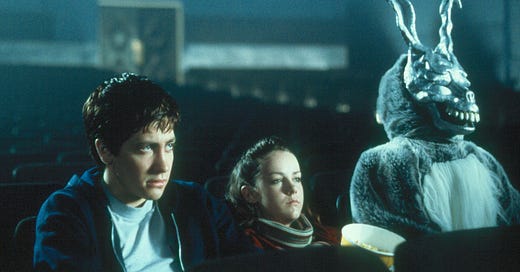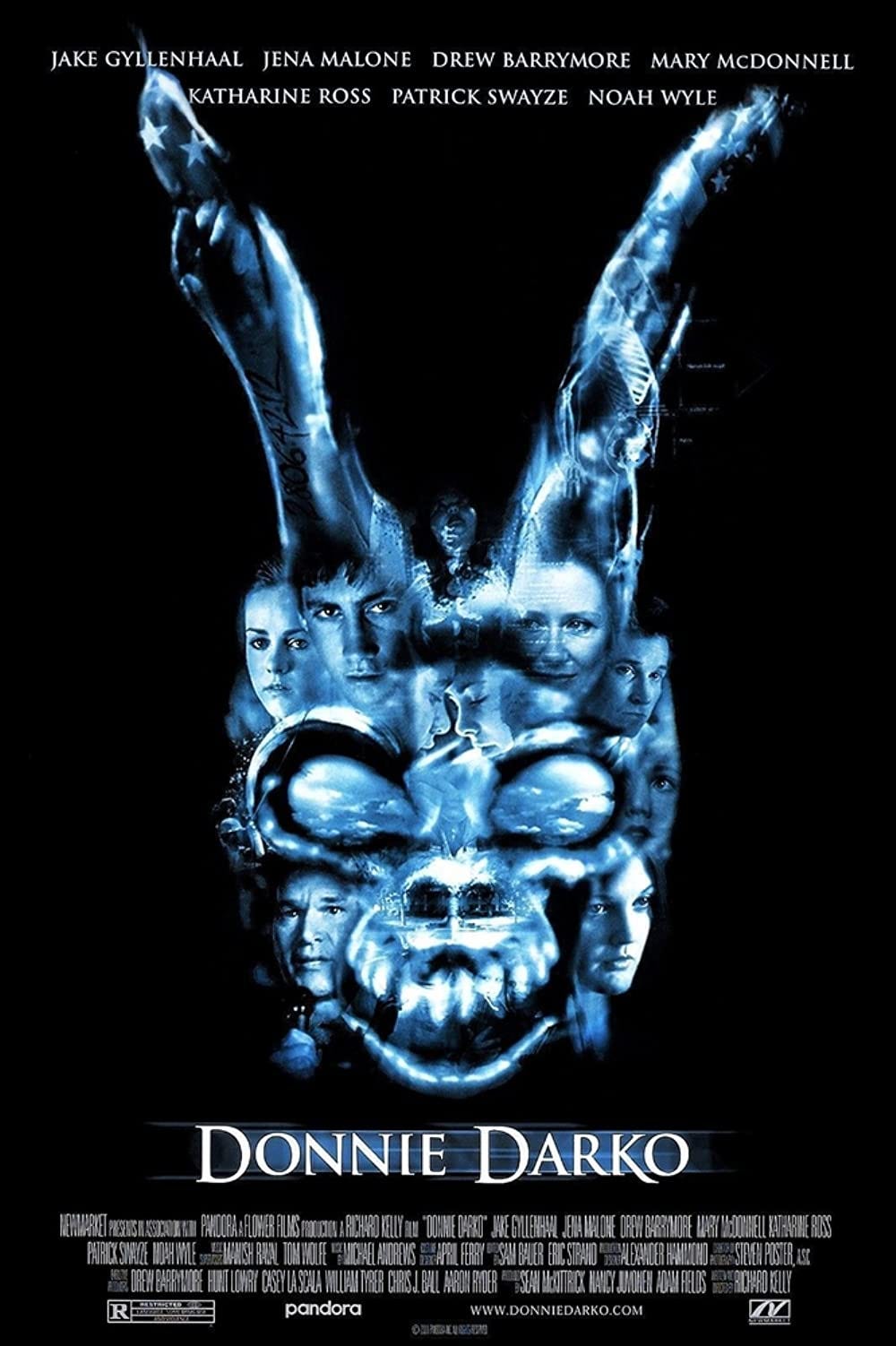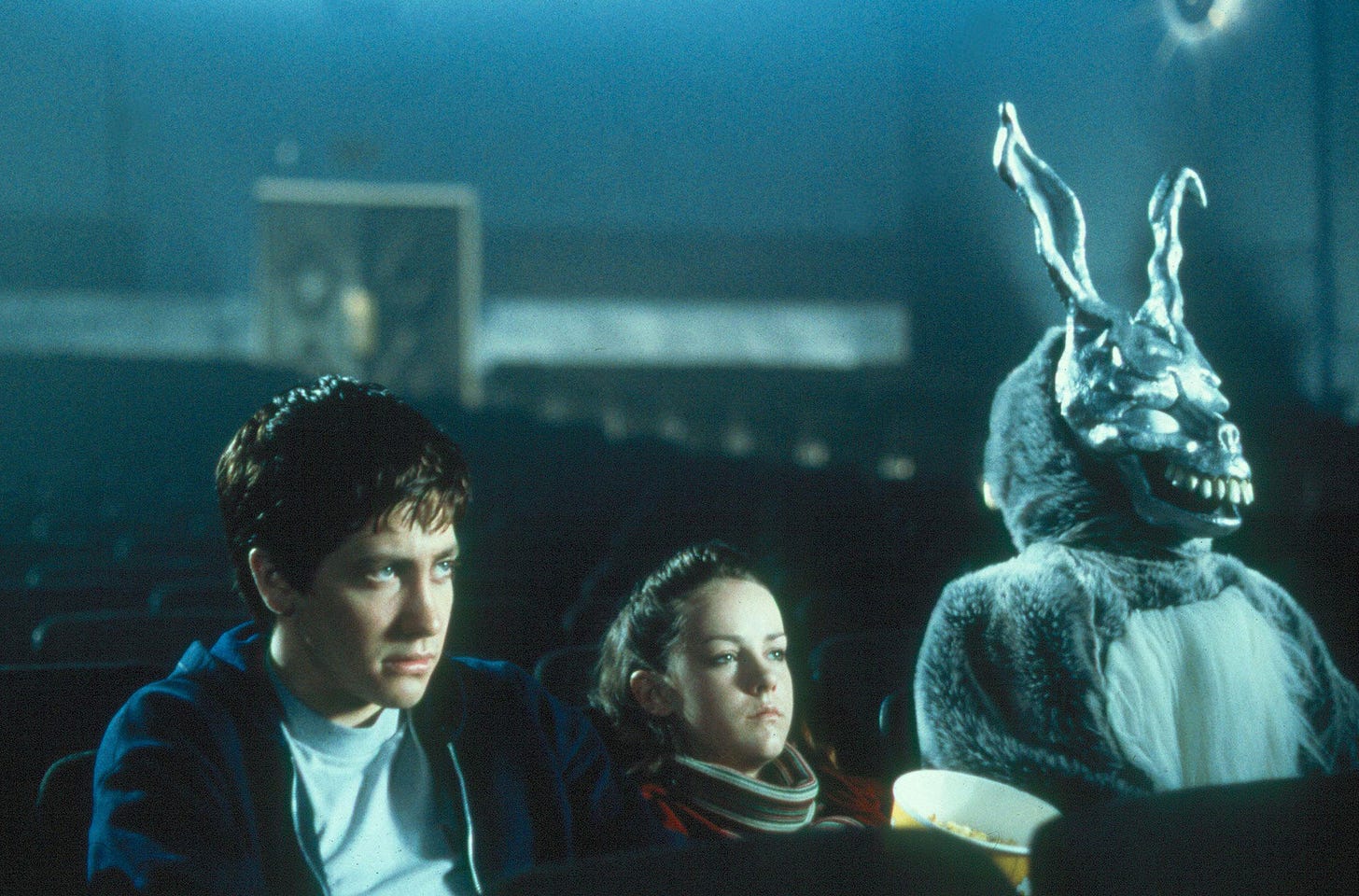Part Seven - 'Donnie Darko:' A Twisty, Turney Sci-Fi That Masks A Core Routed In Love
Does Donnie Darko's hidden gem, its concealed emotional crux, elevate it from the depths of the commonplace science fiction genre?
Before watching Donnie Darko, I had compartmentalised this film into boxes, based on the meagre evidence of the poster and plot summary (which, I can confidently say, just scratched its surface) What I mean to say is that, I had mapped this out as a sci-fi, which strayed into the squirming, twisted conventions of a 2000s horror film. I have also recently discovered the very specific genre I like to term: Jake Gyllenhaal as an unhinged, disturbed being that resides on the dark outer fringes of society. Imagine my surprise when I went from knowing him as the iconic Mysterio in Spider Man: Far From Home to the unfeeling, inhuman beast that is Lou Bloom in Nightcrawler.
However, Gyllenhaal’s penchant for the more villainous and twisted roles have never bored me. There’s always something lurking beneath the surface, alongside the festering malcontent. There’s always a depth to his performances, a message or a vision or an emotion. In Nightcrawler, it was the social commentary, layered within his performance, that critiques America’s slack-handed approach to the dangers of portraying violence in the media. And, in Donnie Darko, it was the questioning of Nihilism and a discussion of which emotions should be valued, acted upon. His roles are potent displays of realism, where it never feels false or bears the resemblance of a caricature.
So, as you can see, my praise of Gyllenhaal is high and mighty. And, today, I’m so excited to be reviewing a film I really enjoyed. Because, although this film boasts a uniquely haunting plot that is both frightening and captivating, a much softer reality is gifted to this story. But in some ways, the emotive side is even harsher than it’s sci-fi elements. In any case, I was starting to worry that every film I reviewed was going to be doused in negativity. But, not today!
Donnie Darko, released in 2002 and directed by Richard Kelly, tells the story of the awkward and troubled teenager Donnie (played by Jake Gyllenhaal), and is set during the presidential election of 1988. One evening, Donnie sleepwalks and befriends the terrifyingly demonic Frank, a rabbit, who tells him that the world is going to end in 28 days. Whilst trying to live a normal life after this incident, Donnie has further encounters with Frank, which threaten his sanity and his new-found relationship with Gretchen (Jena Malone). Throughout watching, the audience are invited to question the existence of Frank and Donnie’s life as a whole; is Frank real or is he a product of Donnie’s mental illness? Is Donnie living in a parallel universe or will the world really come to an end?
A heads up before I continue - there will be no spoilers in this review :)
There is so much to love about how this film conducts itself, the way it plays out. It starts to shift and morph, beginning as a deeply unsettling monstrosity that unravels to reveal vulnerability and humanity. Donnie, as a character, is at the heart of this. From the set of his eyes, slanted and menacing, to the hunched-over shuffle of his walk, he seems almost one-dimensional at a first glance. But, we see this satisfying progression of his morals and his mindset. The struggles he endures ultimately allow him to be reborn anew. Gyllenhaal plays this role with such a deft hand, securing both the stereotypical notes of an 80s horror protagonist and the notes of a lost, emotionally-confused teenager.
The central debate of this movie is its most admirable and memorable feature. At one point, Donnie is in a class where they have to read out scenarios and then mark on a timeline where they sit, where the end points of this timeline are fear and love. Donnie, reasonably, contests this and defiantly argues that every action and every life is so much more than these two emotions. This is developed further, as criticisms and paradoxes arise at every corner, with the preacher of fear/love used in their classes being outed as a paedophile, for instance. This discussion lies at the heart of the movie, as we witness Donnie living and dwindling in his fear but ultimately, acts out of love for those around him, for the concept of life itself. I think that this point alone elevates this from the genre it appears to lie in, making for a deep, philosophical watch that wasn’t even expected by an audience.
Another conversation that is just another supremely delicious layer within this well-constructed cake is the topic of God’s relevancy in our lives. Donnie is often confronted by outcries at his apparent shunning of God and Christianity, even though Donnie’s story is almost a direct parallel to the story of Christ. It cleverly raises an incredibly important philosophical question and betrays a lot about Donnie’s character. For instance, he calls the preacher of love/fear the ‘f*cking antichrist,’ displaying his full rejection of the falsities of a life led solely by these two emotions. He has a vulnerability to his character and that is his emotions, something that he doesn’t quite understand yet but obviously feels incredibly strongly. He is a Nihilist, as he questions the idea of believing in a God, if we are all going to die alone anyways (a point he often references) But, by the film’s conclusion, we witness a countering of this; Donnie realises that God’s existence is basically entirely irrelevant, because God can be found in the people we love. Ugh! That’s literally genius and you can’t tell me otherwise, I’m basically obsessed with the message of this movie because WOW.
To finish off my praise of this, there were moments of inspiration in the musical and visuals elements that I don’t want to go under-appreciated. There were some sounds that felt heightened, like the sound of a camera flashing or a trampoline creaking, that swelled the tension just that little bit more. Genius. The moment where Donnie is first about to encounter Frank is such an ‘oh my god, I literally do not exist outside of this moment in this film’ instance. It’s this incredible shot of an eye, Donnie’s eye, where everything just falls silent as we watch the pupil expand in realisation and in horror. Just strokes of pure, unfiltered cinematic gold.
If I had to critique this, which is genuinely such a shame to do, there were these static shots I wasn’t a fan of as they just felt misplaced and awkward. The script, too, occasionally fell prey to cumbersome moments of unreality, with the teacher asking Gretchen to ‘sit next to the boy she thought was cutest.’ Just would never happen. The portrayal of Donnie’s parents was also very strange, but there are several theories as to why this is, which make sense. I won’t divulge that now because, if you haven’t seen it, I really don’t want to spoil that for you. But, for all of these reasons, Donnie Darko has earned itself a 4/5.
So, to conclude, this wasn’t just a triumph as a science fiction film, but as a sentimental philosophical marvel all of its own. I have yet to see a film like this touch me so deeply, as I haven’t gotten it’s central argument out of my head for days. There’s stores of power in this film that are transcendental. What a brilliant, strange wonder of a film. I will never forget you, Donnie Darko.
BellaWatchesFilms






My most lasting impression from this film is the shot of Frank taking off the mask. Wonderful stuff.